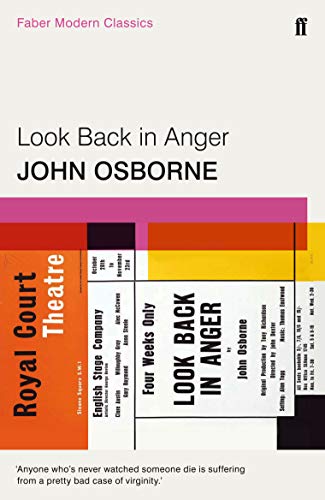
Inhaltsangabe
Look Back in Anger transformed the face of British theatre; legend has it that audiences gasped at the sight of an ironing board on a London stage. John Osborne's play launched the 'angry young men' movement, writers from working or middle class background who had become disillusioned with British society, were sick of contemporary theatre's escapism, and wanted their work to reflect life as they knew it. The play tells the story of a love triangle between Jimmy, an intelligent and educated man of working class background, his upper-middle-class wife Alison, and her superior and disdainful best-friend Helena. Jimmy hates his wife's background, almost as much as he hates himself. Dark and savage, Look Back in Anger makes readers and audiences re-examine what was once called 'the good life'.
Die Inhaltsangabe kann sich auf eine andere Ausgabe dieses Titels beziehen.
Über die Autorinnen und Autoren
John Osborne was born in London in 1929. Before becoming a playwright he worked as a journalist, assistant stage manager and repertory theatre actor. Seeing an advertisement for new plays in The Stage in 1956, Osborne submitted Look Back in Anger. Not only was the play produced, but it was to become considered as the turning point in post-war British theatre. Osborne's protagonist, Jimmy Porter, captured the rebelliousness of an entire post-war generation of 'angry young men'. His other plays include The Entertainer (1957), Luther (1961), Inadmissible Evidence (1964), and A Patriot for Me (1966). He also wrote two volumes of autobiography, A Better Class of Person (1981) and Almost a Gentleman (1991) published together as Looking Back: Never Explain, Never Apologise. His last play, Deja Vu (1991), returns to the characters of Look Back in Anger, over thirty years later. Both Look Back in Anger and The Entertainer were adapted for film, and in 1963 Osborne won an Academy Award for his screenplay for Tom Jones. John Osborne died on 24 December 1994.
David Hare has written over thirty stage plays and thirty screenplays for film and television. The plays include Plenty, Pravda (with Howard Brenton), The Secret Rapture, Racing Demon, Skylight, Amy's View, The Blue Room, Via Dolorosa, Stuff Happens, The Absence of War, The Judas Kiss, The Red Barn, The Moderate Soprano, I'm Not Running and Beat the Devil. For cinema, he has written The Hours, The Reader, Damage, Denial, Wetherby and The White Crow among others, while his television films include Licking Hitler, the Worricker Trilogy, Collateral and Roadkill. In a millennial poll of the greatest plays of the twentieth century, five of the top hundred were his.
Michael Billington has been theatre critic of the Guardian since 1971 and of Country Life since 1986. He is the author of biographies of Harold Pinter and Peggy Ashcroft, critical studies of Tom Stoppard and Alan Ayckbourn, of a celebration of Ken Dodd, a collection of reviews, One Night Stands, State of the Nation: British Theatre since 1945, which won the Theatre Book Prize 2008, and The 101 Greatest Plays: From Antiquity to the Present. He has also edited Directors' Shakespeare: Twelfth Night and Stage and Screen Lives selected from the Dictionary of National Biography.
He frequently lectures and broadcasts on the arts, teaches drama for the University of Pennsylvania and is a Visiting Professor at King's College, London and an Honorary Fellow of St Catherine's College, Oxford.
„Über diesen Titel“ kann sich auf eine andere Ausgabe dieses Titels beziehen.
Weitere beliebte Ausgaben desselben Titels
Suchergebnisse für Look Back In Anger: Faber Modern Classics (Faber Drama)
Look Back in Anger (Faber Drama)
Anbieter: World of Books (was SecondSale), Montgomery, IL, USA
Zustand: Good. Item in good condition. Textbooks may not include supplemental items i.e. CDs, access codes etc. Bestandsnummer des Verkäufers 00054119558
Look Back in Anger : Faber Modern Classics
Anbieter: Better World Books, Mishawaka, IN, USA
Zustand: Good. Main - Faber Modern Classics. Used book that is in clean, average condition without any missing pages. Bestandsnummer des Verkäufers 18011543-20
Look Back in Anger (Faber Drama)
Anbieter: Toscana Books, AUSTIN, TX, USA
Paperback. Zustand: new. Excellent Condition.Excels in customer satisfaction, prompt replies, and quality checks. Bestandsnummer des Verkäufers Scanned057132276X
Look Back in Anger: Faber Modern Classics : Faber Modern Classics
Anbieter: AHA-BUCH GmbH, Einbeck, Deutschland
Paperback. Zustand: Sehr gut. Gebraucht - Sehr gut Sg - leichte Beschädigungen oder Verschmutzungen, ungelesenes Mängelexemplar, gestempelt - Look Back in Anger transformed the face of British theatre; legend has it that audiences gasped at the sight of an ironing board on a London stage. John Osborne's play launched the 'angry young men' movement, writers from working or middle class background who had become disillusioned with British society, were sick of contemporary theatre's escapism, and wanted their work to reflect life as they knew it. The play tells the story of a love triangle between Jimmy, an intelligent and educated man of working class background, his upper-middle-class wife Alison, and her superior and disdainful best-friend Helena. Jimmy hates his wife's background, almost as much as he hates himself. Dark and savage, Look Back in Anger makes readers and audiences re-examine what was once called 'the good life'. Bestandsnummer des Verkäufers INF1000776159
Gebraucht kaufen
Anzahl: 1 verfügbar
Look Back in Anger: Faber Modern Classics
Anbieter: medimops, Berlin, Deutschland
Zustand: good. Befriedigend/Good: Durchschnittlich erhaltenes Buch bzw. Schutzumschlag mit Gebrauchsspuren, aber vollständigen Seiten. / Describes the average WORN book or dust jacket that has all the pages present. Bestandsnummer des Verkäufers M0057132276X-G
Gebraucht kaufen
Anzahl: 1 verfügbar

